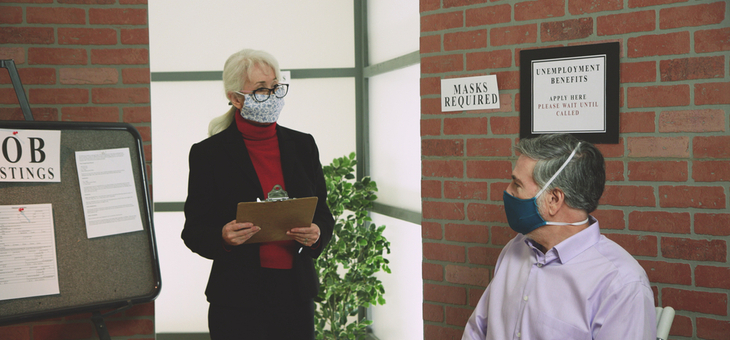Two new surveys reveal the true extent of the emotional, employment and financial struggles heaped on older Australians during the pandemic.
An ongoing LinkedIn study has revealed mature Australians have taken a bigger hit to their savings and confidence in the past six months than any other generation.
And Anglicare Australia’s Jobs Availability Snapshot shows that disadvantaged jobseekers (including many middle-aged people) are competing with more people for fewer jobs.
Reporting on the LinkedIn study, Nine News said that baby boomers – people born between 1946 and 1964 – were most likely to have lost money on retirement accounts, with 53 per cent reporting a drop in their superannuation and retirement funds.
“The uncertainty around employment and money when people are entering those later stages of career and are looking at retiring is probably a contributor as well,” Matt Tindale, country manager for LinkedIn, told nine.com.au.
The Anglicare snapshot examines barriers to finding work. Older workers who lost their jobs later in life are included in this category alongside people who didn’t finish year 12, and people with disabilities. It found that at least eight of these jobseekers are competing for each job at their skill level, most are left out of the JobMaker scheme and the number of people looking for work has more than doubled in the past year.
That means these jobseekers are competing with more experienced workers – not just with each other.
“More than twice as many people are looking for work as when we released last year’s snapshot,” said Anglicare Australia executive director Kasy Chambers. “Underemployment has also shot up, and fewer jobs are being advertised.
“In this downturn, people who need the most help to find work are being left behind. There aren’t enough jobs at their skill level to meet demand in any part of the country. The situation is toughest in SA and Tasmania. In SA, 10 of these jobseekers are competing for each suitable job. And in Tasmania, a staggering 20 jobseekers are competing for each one of these jobs. This doesn’t include people with more skills and experience, who are also competing for this work.”
Ms Chambers says many older jobseekers were facing cuts to their welfare payments and were being forced to “jump through hoops and apply for jobs”.
“But our research shows the jobs just aren’t there.”
She said the system was failing those who needed help.
“If we’re serious about helping people, we need to create jobs that match their skills – instead of forcing them to compete for jobs that just aren’t there.
“We need action on the failing Jobactive Network, which simply isn’t helping people find work. Instead, private providers are paid to punish and breach people.
“And we need to stop cuts to the JobSeeker payment. Record numbers of people are out of work. They shouldn’t be trapped in poverty while they get their lives together.
“These changes are urgent. If we don’t fix this broken system, we will go on forcing people to compete for jobs that simply don’t exist.”
Recruiter Mark Smith told ABC radio’s PM program that older job applicants were often told they wouldn’t be a “cultural fit” because employers worried they would be unable to relate to younger workers.
He said many companies asked how easy it would be for a candidate to strike up banter with younger colleagues in the workplace kitchen.
“It may seem like a strange question, but that’s a benchmark some companies are using to decide who to hire, one Sydney-based recruiter tells us, and the assumption is that older Australians won’t know what to say to their younger colleagues.”
PM reported that for many roles involving technological aptitude, roles, companies choose younger candidates.
Figures from the partly government-funded Centre of Excellence in Population Ageing Research show 18 per cent of workers aged 55–64 believe their organisation discriminates based on age in recruitment.
Australians aged between 45 and 65 now make up about half of all unemployment support recipients, with more than 330,000 on the welfare payment as of September last year.
Age discrimination commissioner Kay Patterson told PM companies were breaching the law if they discriminated based on age.
She doesn’t believe setting age diversity targets would work in the public sector.
“My team here have been working on training programs for the NSW state government to encourage their recruiters to look towards a multi-generational workforce and making sure there’s diversity – not only in terms of gender – but in terms of age as well.
“I think it’s about educating employers that they benefit from having a range of age groups.”
Are you having trouble finding work? How confident are you about having enough work in the next two years?
Jobs for older Australians: olderworkers.com.au
Beyond Blue’s Coronavirus Mental Wellbeing Support Service is a 24/7 service free of charge to all Australians. Visit the site here or call 1800512348.
If you enjoy our content, don’t keep it to yourself. Share our free eNews with your friends and encourage them to sign up.
Related articles:
https://www.yourlifechoices.com.au/government/federal-budget/mature-age-jobless-ignored
https://www.yourlifechoices.com.au/finance/seniors-finance/how-australia-has-changed
https://www.yourlifechoices.com.au/government/federal-government/why-the-budget-failed-in-three-key-areas

